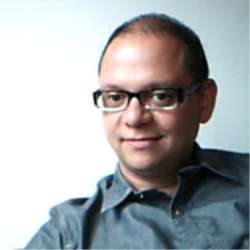No libretto, perhaps, is more specific about location than Tosca’s. The place is Rome in June 1800 and each act is located in a specific landmark. Act 1 takes place in the church of Sant’Andrea della Valle where Tosca’s lover, the painter Cavaradossi, offers his help to Angelotti, a fellow Republican and now a political fugitive gone into hiding. In Act 2, it is in the Palazzo Farnese that the chief of police, Scarpia, tries to coerce Tosca into having sex with him in exchange for Cavaradossi’s life. He fails and dies, stabbed by her. Act 3 is at the top of Castel Sant'Angelo, from which Tosca jumps to her death after realising that the supposed mock execution of Cavaradossi was in fact real. For this newest production by De Nederlandse Reisopera however, director Harry Fehr stages the whole action in just one place: some modern, nondescript police headquarters, complete with ergonomic working stations, video screen and archiving boxes. It might sound unappealing but it mostly works, not least thanks to a fine cast.
In the dystopian police state envisioned by Fehr, the whole city is under the constant scrutiny of Scarpia’s surveillance cameras. In Act 1, we see the chief of police replay, on giant video screens, footage of Tosca’s visit to Cavaradossi in the church where he is at work, and of his subsequent meeting with Angelotti. In Act 3, the monitors have been left switched on and relay Cavaradossi’s execution from the top of the fortress. The videos the audience sees were filmed prior to the production and mirror exactly the action being played by the singers on stage. It is all very cleverly done, with meticulous attention to detail. The occasional (and intentional) blurry screen effects and unavoidable lapses in synchronisation between video and stage action only add to the viewer’s voyeuristic discomfort. However, I couldn’t help noticing that it was in Act 2 that dramatic tension reached its climax, when all my attention could concentrate on Scarpia and Tosca’s highly-charged cat-and-mouse game playing out on stage, without further distraction from the screens.
Managing to sustain such an intense suspense in one of opera's best known scenes is no small achievement and much praise should go to Phillip Rhodes’ Scarpia and Kari Postma’s Tosca whose confrontation was electrifying. With his dark-hued baritone, Rhodes was an excellent Scarpia. His was an unusually classy baron, handsome both in timbre and stage presence, but this didn’t make him any less predatory and sinister. Postma’s soprano lacked the round Italianate timbre that I’d ideally want to hear from Tosca but she compensated with well-judged use of colour and dynamics to give a very convincing portrayal. Her Tosca was self-assured, temperamental but without the diva-esque exaggeration that can annoy in other interpretations, resolute when she knifed Scarpia. Her Mario Cavaradossi, Noah Stewart, sounded both youthful and heroic. The American tenor projected an attractive clarion top, although some slow tempi caused him to briefly stray slightly off pitch a couple of times. His moving “E lucevan le stelle” earned him the loudest applause of the evening.
All the other members of the cast gave fine performances too. I particularly liked Oleksander Pushniak’s Sacristan and Roman Ialcic’s Angelotti. Light soprano Bernadeta Astari sang the young shepherd’s part (who, to fit the staging, was here an office cleaner) beautifully. The Consensus Vocalis and the children’s choir especially recruited and rehearsed for this project impressed in the Te Deum, the only over-the-top colourful ensemble scene in this otherwise bleak world. In the pit, David Parry conducted the Orkest van het Oosten in a richly detailed reading of the score, maintaining the tension at all times.


